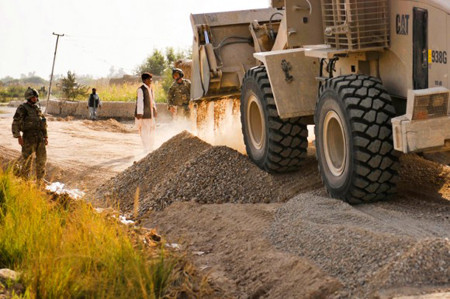By Gol Ahmad Ehsan
Corruption is undermining infrastructure projects in Afghanistan’s Helmand province, as new roads rapidly deteriorate and officials calling a halt to further construction because of concerns about workmanship.
Helmand became one of Afghanistan’s most violent provinces after the fall of the Taleban in 2001, but has moved slowly towards greater stability in the last three years, enabling much-needed construction projects to go ahead.
Residents say, however, say that some of the new roads in the southern province are shoddy, and they suspect corrupt contractors are siphoning off much of the money.
Provincial governor Mohammad Gulab Mangal told IWPR that following complaints from the public, officials suspended work on three roads connecting the provincial centre Lashkar Gah with the Gireshk and Nawa districts and Marja town,
The private contractors responsible will not be allowed to restart unless they promise to improve standards, he said.
“When people complain we have to stop such work,” he said.
About four kilometres of the proposed 11-km road to Greshk are of unacceptable quality and need rebuilding, Mangal said, while the first 11 km of a 32-km road in Marja district are also substandard and further construction is on hold.
Work on a 17-kilometre road into Nawa has been frozen because the company ignored a contractual obligation to remove topsoil before starting construction, he said.
Borjan, a villager in Gireshk, about 40 km north of Lashkar Gah, said residents like him were initially happy to see a new road being built, but quickly realised the asphalt was less than two centimetres thick and that there were no drains or ditches to collect rainwater.
“There was grass growing through parts of the asphalt road,” Borjan said, adding that villagers found this bleakly amusing.
Mangal said problems with the bidding process were largely to blame. Too many companies won contracts through links to powerful officials in Kabul rather than on the strength of their bids, and they had no real knowledge of Helmand, he said.

Construction of Lashkar Gar to Gereshk road in the Nahr e Saraj area of Helmand province, Afghanistan. (Photo: SAC Neil Chapman (RAF)/ Crown Copyright)
The firms also use substandard machinery and unskilled labourers, and foreign donors sometimes fail to release funds on time, the governor added.
Greater oversight from local government would improve the situation, he said, explaining, “When firms are given contracts or money, it should state in the contract that they must work under the supervision of provincial officials. If this is ensured, I’m sure the work will get done properly.”
The Afghan Omed company, which is responsible for building the Gireshk road, denied allegations of inferior workmanship.
Company official Wahidollah said residents had been too quick to criticise the project. When they complained the asphalt was too thin, they did not realise the second layer had yet to be laid.
“Once the second layer is applied, the asphalt will be 25 centimetres thick,” he said. “That will be a better time to assess the quality.”
Another complaint made by local residents is that new roads are sometimes delayed for up to a year. Wahidollah attributed this to security problems, the late release of donor funds, and people trying to stop the route cutting through private property.
“The government needs to take legal and practical actions on private property ownership, because when we come close to someone’s house or land, they refuse to allow us to carrying on the construction,” he said. “Sometimes this causes months of delay.”
The owner of a second construction firm, who asked to remain anonymous, acknowledged that corruption was rife in the industry, and that the work was subcontracted repeatedly, with money skimmed off each time.If one million US was initially earmarked for a new road project, there might only be 100,000 dollars left by the time the funds trickled down to the firm that would actually build it, he claimed.
“Ministers, members of parliament and the Taleban all take a cut of every project,” he alleged. “The public and others expect the work to be good quality... [but] if we are left with only 100,000 of the one million dollars, how are we supposed to produce good quality work?”
Even after the firm begins work, it still has to pay kickbacks to local officials and the Taleban, he said.
“There is no state or government here, and the foreigners are happy about the situation as well, because they too [benefit from] these projects and contracts,” he said.
Abdul Qader Nusrat, head of the provincial works department in Helmand, claimed the general public were partly responsible for the state of the roads.
“They carry heavy loads on these roads illegally – each road can only support a certain weight, so they are quickly destroyed,” he said.Nusrat said his department was not always informed of previous road projects, but now it had a technical team that would not accept the handover of a new road unless it was up to standard.
This is little consolation to Gholam Sakhi, a driver who regularly navigates the bumps and potholes of the unfinished Gireshk road, which is so rough that he has to replace his tyres every month.
This is more than he can afford and he no longer makes any profit, he said, adding that it only took a cursory look around the province to guess where the construction money for roads had gone.
“I swear to God, I know some people who didn’t have a donkey until yesterday, but today they are driving luxury cars because of these projects,” he said, adding that some people had mysteriously built houses worth hundreds of thousands of dollars.
“This is what you call theft. Why doesn’t the government ask them where they got so much money?” he asked.
Gol Ahmad Ehsan is an IWPR-trained reporter in Helmand.



